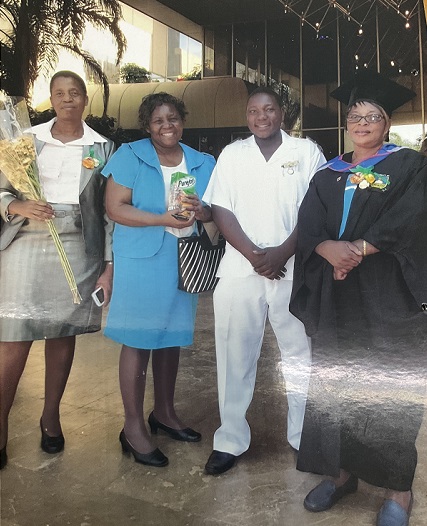
The Sunday Mail

Roselyne Sachiti
Assistant Editor
“THE first cry of a newborn baby gives you so much joy. You forget about the stress of the previous day as you join the mother to celebrate the new arrival. You are always the first to congratulate her.”
This is one of the many joyous moments that trigger Sister Peggy Dube’s excitement when she describes her experience working as a midwife over the past 40 years.
To her, working in the maternity ward has been an exciting experience, though “pregnant” with different outcomes.
“The maternity ward is the happiest department of any health institution. You witness a new life so many times, depending on how busy your ward is. However, it is very distressing when a mother has a stillbirth. You feel her pain,” the 67-year-old health worker told The Sunday Mail last week.

From the age of 22 in September 1978, when she delivered the first baby, Sister Dube has never become tired of her vocation.
Over the decades, she has lost count of the number of babies she delivered — and those delivered when she supervised midwifery students — but says they run into hundreds.
She has two children of her own, Dorothy and Nompumelelo, but also played a mother figure to her nephew Thabani.
In the course of her career, Sister Dube’s generous spirit led her to both rural and urban public health institutions, where she worked and helped bring life into the world.

Having worked at hospitals that include Mpilo in Bulawayo, Sally Mugabe School of Midwifery (formerly Harare Central Hospital) and Gwanda, she has a lot to tell.
As Zimbabwe joins the world to celebrate Mother’s Day today, Sister Dube’s passion and kindness are rekindled.
Her wish is to one day meet some of the babies she safely delivered.
“As a midwife, the best gift you can give to a baby or somebody is to ensure the new-born breathes at birth, in the first minute of birth, which we call the golden minute.
“Every midwife has to ensure the baby breathes within that first minute of birth,” she revealed.
She says the quality of life of a baby thereafter is determined by this golden minute.

“Every person is able to think and have an intact nervous system because the brain received oxygen within that first minute of birth. This is when every baby starts breathing independently of its mother,” she added.
Important role
A midwife is a certified health professional who trained in midwifery and helps women during labour, delivery and after the birth of their babies.
Midwives also play a crucial role in delivering sexual, reproductive, maternal, new-born and adolescent health care services to millions of people in Zimbabwe, as well as globally.
Those like Sister Dube, who have dedicated their lives to this role, are public heroes. They ensure a woman plans her family, has a healthy pregnancy, safe child birth and essential post-natal care for herself and the baby.
No regrets
Retracing her journey, Sister Dube said when she joined the health sector, one had to be a midwife just to move upwards in the profession.
However, she has no regrets, as she discovered that her passion was in midwifery.
“It became a blessing in disguise. I went into midwifery and realised there was so much versatility, innovation, and one could still excel academically even as a midwife, and still serve the patients,” she added.
Back then, Zimbabwe’s high maternal mortality worried her.
“I appreciated the huge role played by midwives in reducing maternal mortality. Maternal mortality refers to deaths due to complications from pregnancy or childbirth. The causes are avoidable. This is when I realised that I had a central role to play in reducing maternal mortality as a practitioner,” added Sister Dube.
To save more lives, she also sharpened her midwifery practical skills and trained in life saving skills, under a skills competency programme run by the Liverpool School of Tropical Medicine, jointly with the Ministry of Health and Child Care (MOHCC) and the University of Zimbabwe between 2010 and 2018.
Educating mothers
Working as a midwife is no easy task. There are instances where she had to skilfully engage in difficult conversations with mothers when they or an unborn baby was at risk.
Many times, she and other midwives educated women, giving them information on decisions they had to make and the condition they were facing.
“There are times when a patient can make a decision purely out of ignorance or because of social and religious factors.
“Some people, because of their religion won’t accept blood transfusion, but will be bleeding heavily. Others would not opt for immunisation because their religion prohibits that. The first point of call is to educate the mothers on the decision they would have taken in a non-threatening manner,” she said.
She would also allow the mothers to ask questions, answer them objectively and let them know of the pros and cons of the decision.
“The ultimate decision is theirs for as long as they are over 18 years old. We ask them to give consent in writing and confirm they have been given all the information, but chosen to go against the advice,” she added.
She has also encountered mothers who refuse to book pregnancies early because of fear of being bewitched.
Special care
Sister Dube has also cared for preterm babies prone to a respiratory complication — respiratory distress syndrome.
“Babies that are born severely premature at 20 weeks are likely to go into respiratory complications.
“What we have to anticipate and manage as midwives is to ensure the babies are very warm. We use heaters to keep the room very warm,” she explained.
To further maintain warmth, Sister Dube said they use a natural process known as kangaroo mother care.
This is when they place the preterm baby on its mother’s chest to prevent hypothermia. They also ensure the baby is breathing and if not, they immediately resort to assisted breathing to give them oxygen.
“Everyone should congratulate the midwife who delivered them. If they had not ensured you breathed, you could have suffered brain damage,” she said.
She also emphasised on proper nutrition, adding that breastfeeding within the first hour of birth was key in child survival. Exclusively breastfeeding for all babies is also important, she pointed out.
At an age when many are settling into retirement, Sister Dube has never been busier.
She has also worked as a principal tutor, training midwives, since 1994 with the MOHCC. Today, she still works with the MOHCC as a consultant.
Complications
While skilled care before, during and after childbirth saves the lives of women and new-borns, complications often arise.
Some young girls and teens fall pregnant when their bodies are still developing and do not seek proper care from health facilities.
These usually have obstructed labour.
“There is also the complication of uterus rapturing, which can lead to death from haemorrhage,” she warned.
In the event that the mother does not bleed to death, the other complication could be obstetric fistula, which Sister Dube said is a social embarrassment.
“The affected mother leaks urine involuntarily. A fistula is difficult to repair and needs specialised surgery.
“To avert this avoidable complication, the woman has to be booked and monitored in a hospital,” added Sister Dube.
Preventing maternal deaths
She is proud that because of the role of midwives in pre-pregnancy, delivery and post-delivery care, including management of complications of pregnancies, midwives have significantly contributed to the reduction in maternal mortality in Zimbabwe.
The provision of family planning services, too, by midwives like Sister Dube has also contributed to the decline.
Studies have shown that family planning reduces up to 40 percent of maternal deaths.
Busy as she is, Sister Dube values time for family life.
“After a hard day’s work, you have a social life, go to church and participate in community activities.”
Besides being a role model to thousands, she warmly laughs that none of her children chose her profession.
“They chose their own career paths. Dorothy is an industrial psychologist, while Nompumelelo opted for the legal fraternity. Thabani is an entrepreneur and marketer,” she said.
On Mother’s Day, Sister Dube wishes all women a happy day.
“Every child is your child. Of special note are children living on the streets and those who have succumbed to drug and substance abuse.
“My passion from a mother’s point of view is to see children rehabilitated from drugs and substance abuse, and lead productive lives and be useful in society,” she said.
Strong partnerships
UNFPA East and Southern Africa regional director Lydia Zigomo said midwives like Sister Dube play an important role in stopping preventable maternal and new-born deaths.
“Well-trained and supported midwives have the potential to provide 90 percent of all essential sexual, reproductive, maternal, and new-born health services, contributing to 4.3 million lives saved annually by 2035,” she said.
In Zimbabwe, UNFPA works with the Government and other partners to help develop a well-trained, competent midwifery workforce. According to UNFPA Zimbabwe, over 4000 midwives have been trained since 2013 and the UN agency has contributed in various ways by supporting the education, practice and regulatory systems and structures.
UNFPA Zimbabwe’s support to midwifery in Zimbabwe and safe motherhood has been funded through various programmes by the governments of Britain, China, Ireland, Japan, Sweden and the European Union.
As part of human resources for health, UNFPA promotes midwifery education, training and service provision. It also advocates stronger workplace policies.
It has supported skills enhancement through a competency-based curriculum. Technical support has been provided in the review of the midwifery curriculum to align it with the International Confederations of Midwives standards.
Twitter: @RoselyneSachiti



